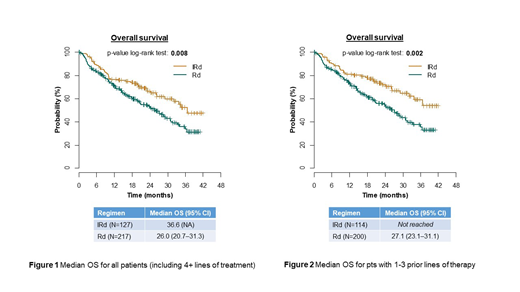Background: Outcomes reported in real-world practice versus controlled clinical trials show markedly shorter treatment durations, progression free survival (PFS) and overall survival (OS). Understanding effectiveness of therapeutic regimens in routine practice is critical for treating physicians as well as for regulatory and reimbursement authorities. We have performed a real-world comparison of two regimens, ixazomib, lenalidomide and dexamethasone (IRD) triplet and lenalidomide and dexamethasone (Rd) doublet in patients with relapsed and/or refractory multiple myeloma (RRMM) treated in seven Czech and one Slovak hematology-oncology centers.
Patients and methods: Between 3/2015 and 5/2017, 344 patients with RRMM were treated with either IRD (N=127) or RD (N=217). Patients selected for both cohorts had the same inclusion and exclusion criteria. Patient baseline characteristics were well balanced. The data were collected through the Czech Registry of Monoclonal Gammopathies (RMG), which is an international database gathering data from patients with monoclonal gammopathies within Central Europe.
Results: The median follow-up in the IRD vs RD arm was 20.8 vs 15.5 months, respectively. Median PFS in pts with 1-3 prior lines for the IRD cohort was 23.1 months (95% CI 11.8-34.5 months) and 11.6 months (95% CI 8.4-11.8 months) for the RD cohort favoring the all-oral triplet (p=0.001). The median PFS for all patients including 4+ line of therapy was 17.5 months (95% CI 10.3-24.7) in the IRD cohort versus 11.5 months (95% CI 8.6-14.3) in the RD group (p=0.005).
Median OS for pts with 1-3 prior lines for IRD cohort was not reached, and was 27.1 months (95% CI 23.1-31.1 months) in the RD cohort (p=0.002). Median OS for all patients, including 4+ lines of treatment was 36.6 months in the IRD vs 26.0 months in the RD cohort (p=0.008).
The PFS benefit of IRD over RD was observed in most of the assessed subgroups; in younger pts ≤65 years with hazard ratio (HR) 0.58, in pts 66-75 years HR 0.64. There was a trend towards better PFS in patients with lower ISS stage; ISS1 HR 0.53, ISS2 HR 0.58 and ISS3 the HR was 0.87. Patients in the 1st relapse (HR 0.53) benefited most from the IRD, followed by the 2nd relapse (HR 0.58), 3rd relapse (HR 0.90) and pts relapsing after 4+ therapies (HR 0.88). The PFS benefit of IRD regimen was observed in pts regardless of previous stem cell transplantation; transplant-eligible patients HR 0.51 and transplant-ineligible HR 0.71. Patients who did not benefit from the triplet regimen were those over 75 years of age and pts with the presence of extramedullary disease.
The IRD treatment was well tolerated. The safety profile was concordant with previously reported data.
Conclusions: This RMG comparative cohort analysis shows PFS benefit of all-oral IRD regimen over RD in the real world setting, and confirms growing evidence that long term outcomes with IRD triplet are comparable with phase 3 TOURMALINE-MM1 trial. Our analysis also shows an overall survival benefit of IRD over RD treatment. Patients older than 75 years, with 4+ lines of therapy and presence of extramedullary disease did not profit from addition of ixazomib to RD doublet.Additional data with larger patient populations confirming RWE effectiveness are warranted.
With support of AZV 17-29343A, NV18-03-00500, FNOl 00098892, IGA-LF-2019-001, PROGRES Q40/08, MH CZ-DRO (UHHK, 00179906)
Minarik:Celgene: Consultancy, Honoraria, Research Funding; Amgen, BMS, Janssen-Cilag, Takeda: Consultancy, Honoraria. Straub:Amgen, Takeda, Celgene: Consultancy. Spicka:Celgene: Consultancy, Honoraria; Celgene: Consultancy, Honoraria; Amgen: Consultancy, Honoraria; Amgen: Consultancy, Honoraria; Novartis: Consultancy, Honoraria; Sanofi: Consultancy; Takeda: Consultancy, Honoraria; Novartis: Consultancy, Honoraria; Janssen-Cilag: Consultancy, Honoraria; Takeda: Consultancy, Honoraria; Janssen-Cilag: Consultancy, Honoraria; Sanofi: Consultancy. Skacel:Millennium Pharmaceuticals, Inc., subsidiary of Takeda Pharmaceutical Company Limited: Employment. Maisnar:Janssen, Amgen, Celgene, Takeda, BMS: Consultancy, Honoraria.
Author notes
Asterisk with author names denotes non-ASH members.


This feature is available to Subscribers Only
Sign In or Create an Account Close Modal